 With just weeks to go before mid-term elections and a "too close to call" Gubernatorial contest, disenfranchisement and electoral chaos in Scott Walker's Wisconsin reign supreme. And only the U.S. Supreme Court may now be able to do anything about it.
With just weeks to go before mid-term elections and a "too close to call" Gubernatorial contest, disenfranchisement and electoral chaos in Scott Walker's Wisconsin reign supreme. And only the U.S. Supreme Court may now be able to do anything about it.
In a 5 to 5 ruling, an evenly divided, en banc U.S. 7th Circuit Court of Appeal has issued a Cursory Order [PDF], summarily denying an ACLU Petition for an Emergency Rehearing to put the brakes back on the state Republicans' Photo ID voting restriction in advance of the November election.
The ACLU petition followed on the recent extraordinary ruling by three Republican appointees to the federal bench that had vacated a permanent federal court injunction of the law. That injunction, until it was lifted by the three-judge 7th Circuit panel just weeks ago, prevented Wisconsin from enforcing a Photo ID voting law which a U.S. District Court judge had found would likely result in the disenfranchisement of up to 300,000 perfectly lawful registered voters who lack the now-requisite, state approved photo IDs.
As we recently reported, the ACLU, in its emergency petition, argued that it will be virtually impossible for the Badger state's Department of Motor Vehicles to process the number of official state photo IDs that would be required to insure that every lawfully registered voter who desires to vote would get the opportunity to vote in the upcoming Nov. 4 election. Moreover, thousands of absentee ballots that had already been mailed prior to the 7th Circuit panel's lifting of the injunction may not be counted since they did not include notice of the new rules requiring that they must be accompanied with copy of the voter's photo ID.
Following the 5 to 5 decision of the full 7th Circuit (one seat remains vacant, more on that below), the ACLU and other plaintiffs' only recourse for now will be an emergency petition to the U.S. Supreme Court. Given the deadlock by the 7th Circuit and reasoning applied not only by the original U.S. District Court Judge in this case, and also by a 6th Circuit panel in an Ohio early voting case, as well as by six (6) of the (9) U.S. Supreme Court Justices who took part in a landmark 2008 Photo ID decision --- all decisions which were inconsistent with the reasoning applied by the three-judge 7th Circuit panel in the Wisconsin case, which has now been essentially upheld --- a challenge at the U.S. Supreme Court has at least a reasonable prospect of success.
If you're confused, read on. We'll help you make sense of this...
Tie goes to Walker
Ironically, the ACLU lost its emergency petition for a rehearing en banc (before the full 7th Circuit) even though it had convinced five (5) of the seven (7) judges, who did not participate in the earlier decision by the three-judge panel, to grant the emergency petition.
The irony here can be partially attributed to the fact that President Barack Obama and the Democratic majority in the U.S. Senate had failed to nominate and confirm someone to the vacant seat on the 7th Circuit. That seat has been vacant since Jan. 7, 2010. As a result, only three (3) of the ten (10) judges now serving on the full 7th Circuit were nominated by Democratic Presidents. Two judges who had been nominated by Republican Presidents, Richard Posner and Ilana Rovner, joined the three who were nominated by Democrats in voting to grant the ACLU's emergency petition. But it wasn't enough.
All five (5) judges who voted to deny the emergency petition, including the three (3) who participated in the extraordinary panel decision that lifted the injunction against the law, were nominated by Republican Presidents. They include Judge Frank H. Easterbrook, a member of the Robert Bork-founded, Koch Brothers-funded "Federalist Society", which is committed to nothing less than a "counter-revolution" in law.
Democracy can scarcely expect to receive a fair hearing from "Radicals in Robes," who are committed to the Kochs' vision of an American oligarchy.
Had there been an additional moderate jurist on the bench, in all likelihood, the petition would have been granted (6 - 5). Instead, the 5 - 5 split left the original three-judge panel decision in place, with the defendant, Wisconsin's Republican Gov. Scott Walker, likely to be the principle beneficiary in his current "toss up" re-election bid against Democrat Mary Burke. That's especially true, given the District Court's finding in the case that blocked the law previously, that the estimated 300,000 WI voters who lack the requisite, state-approved forms of photo ID, disproportionately hail from demographic groups that tend to vote for Democrats.
Walker was originally elected in 2010, as the lower court's judge had found, by far less than the number of voters estimated to be lacking the ID now required to cast a vote in the Badger State. Yes, the 7th Circuit's decision, as it currently stands, could well mean the difference between re-election and failure for the state's radical Republican governor.
Reasonable chance SCOTUS will decide
If a majority of U.S. Supreme Court Justices are to be believed, the 7th circuit's decision, upheld by the tie vote, is simply wrong. At least it's in contrast with the majority of SCOTUS Justices.
As we recently touched upon in covering the 6th Circuit three-judge panel's decision affirming an Ohio District Court's ruling overturning that state GOP's effort to limit days and hours for early voting, the rationale applied by the all Republican, three-judge 7th Circuit panel in overturning Judge Adelman's WI injunction is inconsistent with opinions signed onto by six (6) of the nine (9) Justices of the U.S. Supreme Court in Crawford vs. Marion County Elections Board (2008).
Crawford involved the allegation that Indiana's first-in-the-nation Photo ID voting restriction was unconstitutional "on its face." Six of the U.S. Supreme Court's nine Justices rejected that facial challenge. However, only three (3) (Scalia, Thomas and Alito) of the Court's nine (9) Justices concluded, as did the three judges on the 7th Circuit panel that overturned Judge Adelman's WI injunction, that a Photo ID law must be upheld if the language of the statute is similar to that which had been adopted by Indiana.
As correctly observed by Judge Adelman when he imposed the now-overturned injunction in this case, six (6) of the nine (9) Supreme Court Justices in the Crawford ruling concurred that the correct approach is to apply what Adelman described as the Anderson/Burdick test. That test mandates that courts, on a case-by-case basis, must measure a law's potential damage to voters' right to vote, against the specific claims made by the state as to why such additional burdens and restrictions are necessary. And Adelman demonstrated that there was no substance to the claims made by Wisconsin's Republicans that photo ID's were necessary to prevent virtually non-existent voter fraud in the Badger State.
(For example, a recent study conducted by Loyola University Law Prof. Justin Levitt and NYU's Brennan Center of Justice, which was released subsequent to Adelman's decision, revealed that out of more than one billion votes cast in all 50 states over the past 14 years, there have been only 31 instances in which in-person voter impersonation --- the only type of voter fraud that can be prevented by polling place photo ID statutes --- "might" have occurred.)
The lead opinion in Crawford was written by former Supreme Court Justice John Paul Stevens (joined by Chief Justice Roberts and by Justice Kennedy). That opinion revealed that the only reason that Indiana's statute was upheld in 2008 was because the plaintiffs had failed to produce "concrete evidence of the burden imposed on voters who currently lack photo identification." Based solely on the record before it, the Court, via that lead opinion, said it "cannot conclude that the statute imposes 'excessively burdensome requirements' on any class of voters."
Significantly, however, Judge Richard Posner, who voted to grant the ACLU's emergency petition in the WI case, was the author of the 2008 7th Circuit Panel decision that upheld by the Supreme Court in Crawford. Yes, the judge who originally helped decide the nation's first Photo ID case has, in the ensuing years, essentially discovered that he got it wrong.
In October 2013, during a book-tour interview, Judge Posner, largely recanted his Crawford panel opinion, stating that he had erred in upholding the Indiana statute without having first acquired sufficient evidence of its adverse impact on the right to vote.
Moreover, Justice Stevens, who retired in 2010, was asked about his own lead opinion the Crawford case shortly after Posner's admission. Stevens told the Wall Street Journal at the time that he "always thought that [dissenter] David Souter got the thing correct, but my own problem with the case was that I didn't think the record [the existing evidence before the Court at the time] supported everything he said in his opinion."
In his dissent, Souter opined that the Hoosier State's polling place Photo ID law "threatens to impose nontrivial burdens on the voting right of tens of thousands of the State's citizens...and a significant percentage of those individuals are likely to be deterred from voting."
Now, the U.S. Supreme Court is faced with the prospect that the failure to immediately reinstate this injunction in WI could result in the disenfranchisement of as many as 300,000 voters in the state, and that those disenfranchised would disproportionately be minorities --- a prospect that is based upon detailed factual findings by a U.S. District Court judge. Those findings are entitled to "great weight" on appeal.
These issues arise against the backdrop of other Supreme Court precedents, cited by the ACLU in its emergency petition, which "uniformly caution against such eleventh-hour changes to the election laws, even where those courts have approved those changes for future elections."
If the Supreme Court does intervene on an emergency basis, the best the ACLU can hope for is a reinstatement of the injunction solely with respect to the November election. It is exceedingly doubtful that the Court would address the broader issues until after a full hearing on the merits during its next term. By then, the Court might be considering additional, similar cases emerging from states like North Carolina and Texas, where Republicans are also attempting to enforce Photo ID restrictions on hundreds of thousands of legally registered voters.
UPDATE 10/2/2014: Plaintiffs appeal to the U.S. Supreme Court where a moment of truth for democracy and at least two SCOTUS Justices now await. Full details now here...
(Snail mail support to "Brad Friedman, 7095 Hollywood Blvd., #594 Los Angeles, CA 90028" always welcome too!)
|


 A Pretty Weak 'Strongman': 'BradCast' 10/30/25
A Pretty Weak 'Strongman': 'BradCast' 10/30/25 'Green News Report' 10/30/25
'Green News Report' 10/30/25
 Proposal for 'First Politically Viable Wealth Tax' Takes Shape in CA: 'BradCast' 10/29/25
Proposal for 'First Politically Viable Wealth Tax' Takes Shape in CA: 'BradCast' 10/29/25 Monster Storm, Endless Wars, Gamed Elections:
Monster Storm, Endless Wars, Gamed Elections: 'Green News Report' 10/28/25
'Green News Report' 10/28/25 Let's Play 'Who Wants
Let's Play 'Who Wants Sunday 'Cartoonists Dilemma' Toons
Sunday 'Cartoonists Dilemma' Toons Exiled NOAA Scientists Resurrect Critical Disaster Database: 'BradCast' 10/23/25
Exiled NOAA Scientists Resurrect Critical Disaster Database: 'BradCast' 10/23/25  'Green News Report' 10/23/25
'Green News Report' 10/23/25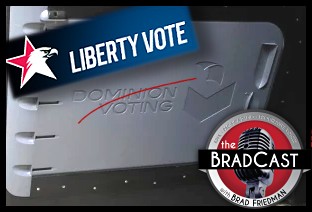 Trump-Allied GOP Partisan Buys Dominion Voting Systems: 'BradCast' 10/22/25
Trump-Allied GOP Partisan Buys Dominion Voting Systems: 'BradCast' 10/22/25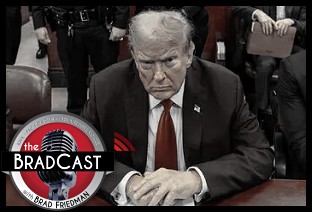 Trump, Republican Law(lessness) & (Dis)Order: 'BradCast' 10/21/25
Trump, Republican Law(lessness) & (Dis)Order: 'BradCast' 10/21/25 'Green News Report' 10/21/25
'Green News Report' 10/21/25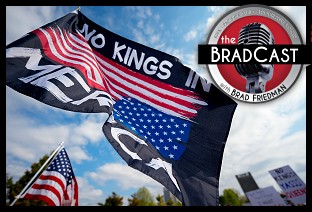 Celebrating 'No Kings': 'BradCast' 10/20/25
Celebrating 'No Kings': 'BradCast' 10/20/25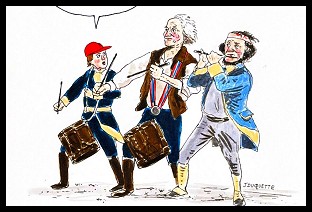 Sunday 'How It Started' Toons
Sunday 'How It Started' Toons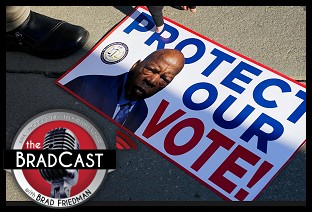 SCOTUS Repubs Appear Ready to Gut Rest of Voting Rights Act: 'BradCast' 10/16/25
SCOTUS Repubs Appear Ready to Gut Rest of Voting Rights Act: 'BradCast' 10/16/25 'Green News Report' 10/16/25
'Green News Report' 10/16/25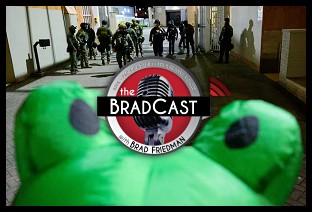 The 'Epstein Shutdown' and Other Autocratic Nightmares: 'BradCast' 10/15/25
The 'Epstein Shutdown' and Other Autocratic Nightmares: 'BradCast' 10/15/25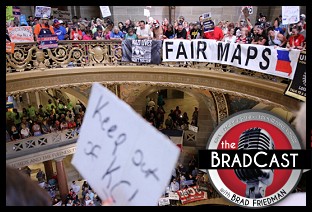 Group Vows to Block MO's GOP U.S. House Gerrymander: 'BradCast' 10/14/25
Group Vows to Block MO's GOP U.S. House Gerrymander: 'BradCast' 10/14/25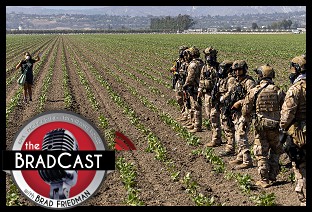 Trump Labor Dept. Warns Trump Policies Sparking Food Crisis: 'BradCast' 10/9/25
Trump Labor Dept. Warns Trump Policies Sparking Food Crisis: 'BradCast' 10/9/25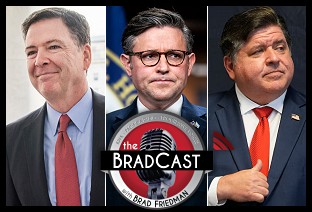 Trump's Losing Battles: 'BradCast' 10/8/25
Trump's Losing Battles: 'BradCast' 10/8/25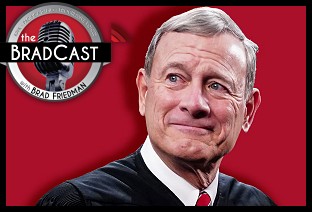 Trump, Roberts and His Stacked, Packed and Captured SCOTUS: 'BradCast' 10/7/25
Trump, Roberts and His Stacked, Packed and Captured SCOTUS: 'BradCast' 10/7/25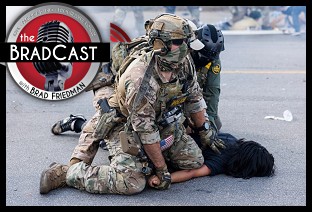 Trump Attempting His 'Invasion from Within': 'BradCast' 10/6/25
Trump Attempting His 'Invasion from Within': 'BradCast' 10/6/25 Biden Budget Expert: Mass Firings in Shutdown 'Illegal': 'BradCast' 10/2/25
Biden Budget Expert: Mass Firings in Shutdown 'Illegal': 'BradCast' 10/2/25 Why is DOJ Suing 'Blue' States for Their Voter Databases?: 'BradCast' 10/1/25
Why is DOJ Suing 'Blue' States for Their Voter Databases?: 'BradCast' 10/1/25
 VA GOP VOTER REG FRAUDSTER OFF HOOK
VA GOP VOTER REG FRAUDSTER OFF HOOK Criminal GOP Voter Registration Fraud Probe Expanding in VA
Criminal GOP Voter Registration Fraud Probe Expanding in VA DOJ PROBE SOUGHT AFTER VA ARREST
DOJ PROBE SOUGHT AFTER VA ARREST Arrest in VA: GOP Voter Reg Scandal Widens
Arrest in VA: GOP Voter Reg Scandal Widens ALL TOGETHER: ROVE, SPROUL, KOCHS, RNC
ALL TOGETHER: ROVE, SPROUL, KOCHS, RNC LATimes: RNC's 'Fired' Sproul Working for Repubs in 'as Many as 30 States'
LATimes: RNC's 'Fired' Sproul Working for Repubs in 'as Many as 30 States' 'Fired' Sproul Group 'Cloned', Still Working for Republicans in At Least 10 States
'Fired' Sproul Group 'Cloned', Still Working for Republicans in At Least 10 States FINALLY: FOX ON GOP REG FRAUD SCANDAL
FINALLY: FOX ON GOP REG FRAUD SCANDAL COLORADO FOLLOWS FLORIDA WITH GOP CRIMINAL INVESTIGATION
COLORADO FOLLOWS FLORIDA WITH GOP CRIMINAL INVESTIGATION CRIMINAL PROBE LAUNCHED INTO GOP VOTER REGISTRATION FRAUD SCANDAL IN FL
CRIMINAL PROBE LAUNCHED INTO GOP VOTER REGISTRATION FRAUD SCANDAL IN FL Brad Breaks PA Photo ID & GOP Registration Fraud Scandal News on Hartmann TV
Brad Breaks PA Photo ID & GOP Registration Fraud Scandal News on Hartmann TV  CAUGHT ON TAPE: COORDINATED NATIONWIDE GOP VOTER REG SCAM
CAUGHT ON TAPE: COORDINATED NATIONWIDE GOP VOTER REG SCAM CRIMINAL ELECTION FRAUD COMPLAINT FILED AGAINST GOP 'FRAUD' FIRM
CRIMINAL ELECTION FRAUD COMPLAINT FILED AGAINST GOP 'FRAUD' FIRM RICK SCOTT GETS ROLLED IN GOP REGISTRATION FRAUD SCANDAL
RICK SCOTT GETS ROLLED IN GOP REGISTRATION FRAUD SCANDAL VIDEO: Brad Breaks GOP Reg Fraud Scandal on Hartmann TV
VIDEO: Brad Breaks GOP Reg Fraud Scandal on Hartmann TV RNC FIRES NATIONAL VOTER REGISTRATION FIRM FOR FRAUD
RNC FIRES NATIONAL VOTER REGISTRATION FIRM FOR FRAUD EXCLUSIVE: Intvw w/ FL Official Who First Discovered GOP Reg Fraud
EXCLUSIVE: Intvw w/ FL Official Who First Discovered GOP Reg Fraud GOP REGISTRATION FRAUD FOUND IN FL
GOP REGISTRATION FRAUD FOUND IN FL

































